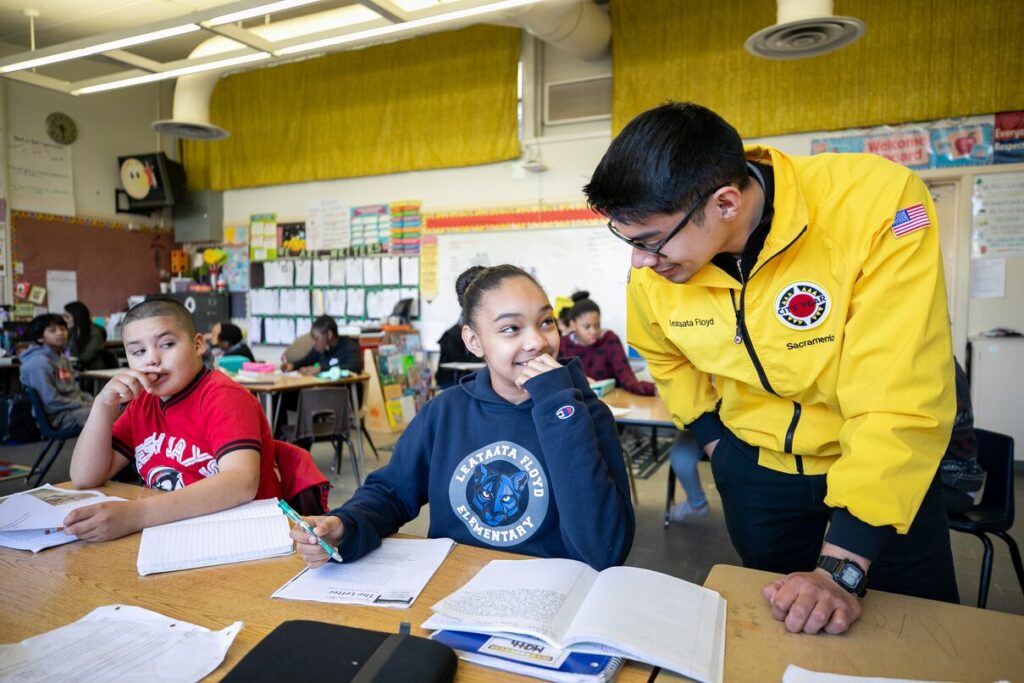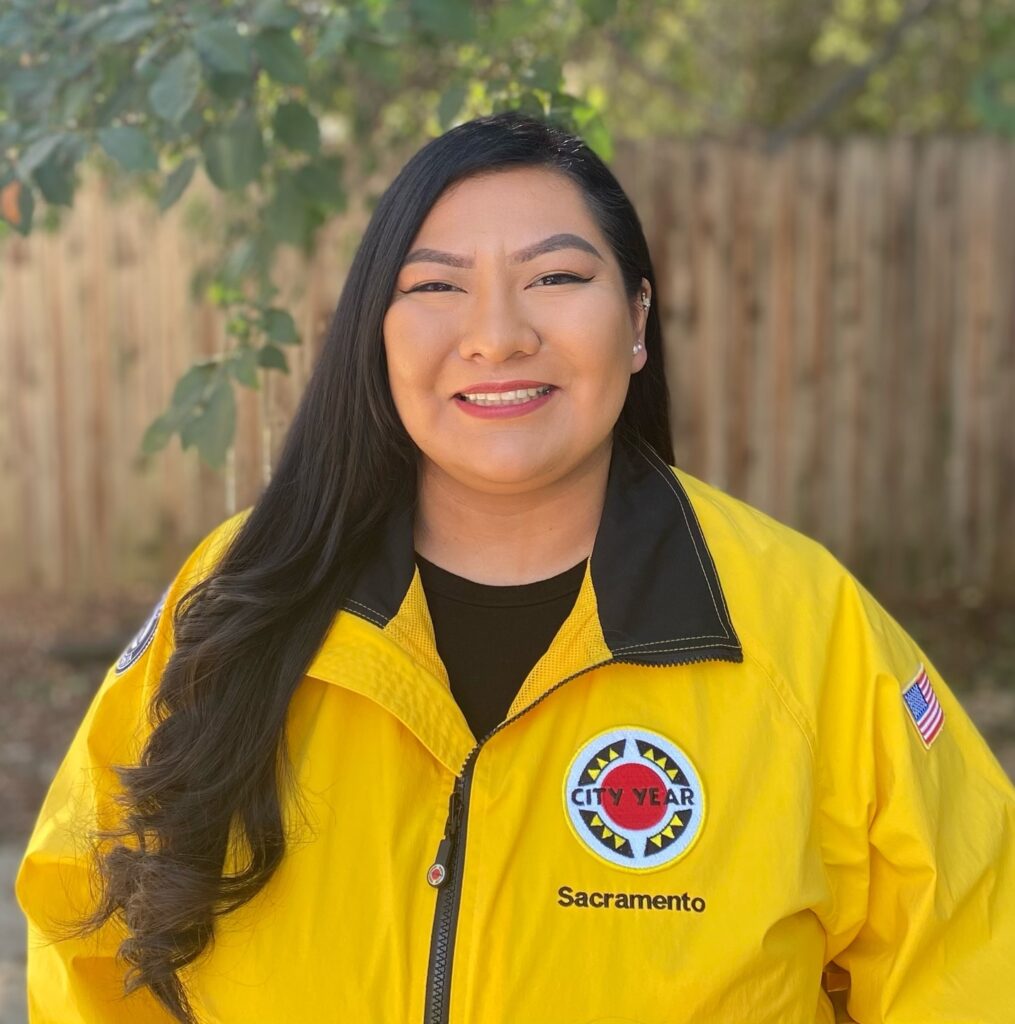Want increased student attendance? Focus on relationships, joy and belonging.
September is Attendance Awareness Month, and our partner Attendance Works is providing several new resources for families and educators aimed to dramatically reduce chronic absenteeism and get the school year off to a strong start.
But attendance is not just a big topic in September. These days, most everyone involved in education seems to be talking about how to tackle chronic absenteeism.
Research shows that chronic school absence creates a series of negative consequences for young people and for society. We also know that chronic absenteeism has only worsened since the pandemic.
What we’ve learned through our work with students and schools is that proximity, joy and belonging have a lot to do with increasing student attendance and engagement. As daunting as this problem is, there is a lot that can be done to address attendance issues.
We asked City Year Sacramento Learning and Development Manager Jenny Calixto what advice she would give to tutors, mentors, student success coaches, and other caring adults in schools to help students better engage, attend school more frequently, and get the school year off to a strong start.
Q: Jenny, what do you think is the single most important factor that can help students attend school more and engage more fully with their learning?
Jenny Calixto (JC): I think because I’ve had different roles within City Year, I’ve been able to see attendance and student engagement from different points of view.
But whether I was serving as a City Year AmeriCorps member or working to guide and support corps members as an impact manager, I realized that while academic growth is where we understandably put a lot of our time and energy, the relationship building we do with students is just as important.
Check out a start-of-year checklist for tutors, mentors and role models.
The center of our work in schools is building positive relationships with students. We know from years of feedback from our partner teachers and principals that City Year corps members often help to encourage and inspire some students to attend school more frequently and that their steady, caring and consistent presence in schools makes a difference.
When students connect with someone they trust, that becomes the foundation for all work we do in schools.
When a student success coach tells a student, “I missed you yesterday,” or makes a call home to check in on an absent student, those spaces are so powerful when we think about attendance.
Learn how City Year student success coaches are helping to improve attendance in schools across the country.
We’re letting students and families know, “we notice you, we’re here for you, you can talk to us and let us know what’s going on.”

Q: What do you think gets lost in conversations about chronic absenteeism and how to boost student attendance?
JC: When we think of attendance, we often think just on the surface—that students aren’t just showing up. We don’t always think about exploring it more deeply, talking with parents and teachers about what those factors might be.
Sometimes it’s less about the learning environment than it is basic needs. Are their basic needs being met? Do they have a safe place to go to? Do they have a safe adult to go to? Is a student experiencing housing or food insecurity, or struggling with a mental health issue? Maybe a parent has to work late, and the student may need extra support. Those factors can be overlooked.
Explore how student success coaches build trust and confidence with students.
And City Year AmeriCorps members aren’t trained or expected to directly address those issues. But as a trusted adult, they can sometimes help identify those issues and bring them to professionals who can help students and families, like guidance counselors and school psychologists.
Q: What encouragement would you give to educators, student success coaches and other caring adults who work with students in schools?
JC: The problems that schools, students and teachers are facing are real. But in the schools where I’ve served in Sacramento, it’s so exciting every day to see City Year AmeriCorps members in their yellow jackets in the hallways and classrooms.
Students know they can trust our corps members.
Why building trust in schools matters.
Students will come up at the start of school and ask, “Who is my City Year this year?” They want to know and they’re so excited. It’s one of the most joyous things I’ve ever experienced.
Partner teachers are so excited to have City Year corps members in their classrooms. We of course look at academic growth throughout the year, but it’s harder to measure the power of the relationships that are built without experiencing it.
The unique structure of City Year, bringing in near-peer tutors and mentors who are 17 to 25 years old, means AmeriCorps members are able to form different relationships with students than teachers and other adults can.
Corps members are not just overseeing independent work or facilitating small group instructor or tutoring—they’re also around at recess, at lunch time, at dismissal. We’re able to navigate in between moments, small moments that can go unnoticed but can really impact a student’s school day.
So, I’d just remind anyone serving who is feeling a bit overwhelmed, don’t doubt you are making a difference.
Learn more about what to expect when you serve with City Year. And check out a recent “Why We Matter” podcast on attendance with Bob Balfanz from Johns Hopkins University’s Everyone Graduates Center.
Author
Jenny Calixto is a learning and development manager at City Year Sacramento. A City Year alum (Sacramento ’21, ’22), Calixto worked with City Year as impact manager for two years after her corps years, supporting City Year AmeriCorps members during their year of service in schools as student support coaches.

Related stories
So, you’re about to start your first year as a tutor, mentor or student success coach, working closely with K-12...
Read more about Back to school checklist for tutors, mentors and role modelsCity Year AmeriCorps members make great mentors for the students we serve. Learn more about what it takes to be...
Read more about Five qualities that will make you a great mentorLearn what it’s like to serve at City Year and what to expect at the start of service. City Year...
Read more about What to expect at the start of City Year serviceHave some burning questions before applying to serve with City Year? Find those answers here!
Read more about Top five questions you have about City Year service, answered















